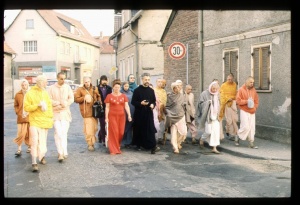CC Madhya 22.91: Difference between revisions
m (1 revision(s)) |
No edit summary |
||
| Line 1: | Line 1: | ||
{{ | [[Category:Sri Caitanya-caritamrta - Madhya-lila Chapter 22|C091]] | ||
<div style="float:left">'''[[Sri Caitanya-caritamrta|Śrī Caitanya-caritāmṛta]] - [[CC Madhya|Madhya-līlā]] - [[CC Madhya 22|Chapter 22: The Process of Devotional Service]]'''</div> | |||
<div style="float:right">[[File:Go-previous.png|link=CC Madhya 22.88-90|Madhya-līlā 22.88-90]] '''[[CC Madhya 22.88-90|Madhya-līlā 22.88-90]] - [[CC Madhya 22.92|Madhya-līlā 22.92]]''' [[File:Go-next.png|link=CC Madhya 22.92|Madhya-līlā 22.92]]</div> | |||
{{CompareVersions|CC|Madhya 22.91|CC 1975|CC 1996}} | |||
{{RandomImage}} | |||
==== TEXT 91 ==== | ==== TEXT 91 ==== | ||
<div | <div class="verse"> | ||
varaṁ huta-vaha-jvālā- | :varaṁ huta-vaha-jvālā- | ||
pañjarāntar-vyavasthitiḥ | :pañjarāntar-vyavasthitiḥ | ||
na śauri-cintā-vimukha- | :na śauri-cintā-vimukha- | ||
jana-saṁvāsa-vaiśasam | :jana-saṁvāsa-vaiśasam | ||
</div> | </div> | ||
| Line 14: | Line 18: | ||
==== SYNONYMS ==== | ==== SYNONYMS ==== | ||
<div | <div class="synonyms"> | ||
''varam''—better; ''huta-vaha''—of fire; ''jvālā''—in the flames; ''pañjara-antaḥ''—inside a cage; ''vyavasthitiḥ''—abiding; ''na''—not; ''śauri-cintā''—of Kṛṣṇa consciousness, or thought of Kṛṣṇa; ''vimukha''—bereft; ''jana''—of persons; ''saṁvāsa''—of the association; ''vaiśasam''—the calamity. | |||
</div> | </div> | ||
| Line 21: | Line 25: | ||
==== TRANSLATION ==== | ==== TRANSLATION ==== | ||
<div | <div class="translation"> | ||
"'It is better to accept the miseries of being encaged within bars and surrounded by burning flames than to associate with those bereft of Kṛṣṇa consciousness. Such association is a very great hardship.' | |||
</div> | </div> | ||
| Line 28: | Line 32: | ||
==== PURPORT ==== | ==== PURPORT ==== | ||
<div | <div class="purport"> | ||
This is a quotation from the Kātyāyana-saṁhitā. | This is a quotation from the ''Kātyāyana-saṁhitā''. | ||
</div> | </div> | ||
__NOTOC__ | |||
<div style="float:right; clear:both;">[[File:Go-previous.png|link=CC Madhya 22.88-90|Madhya-līlā 22.88-90]] '''[[CC Madhya 22.88-90|Madhya-līlā 22.88-90]] - [[CC Madhya 22.92|Madhya-līlā 22.92]]''' [[File:Go-next.png|link=CC Madhya 22.92|Madhya-līlā 22.92]]</div> | |||
__NOTOC__ | |||
__NOEDITSECTION__ | |||
Revision as of 08:19, 11 September 2021

His Divine Grace
A.C. Bhaktivedanta Swami Prabhupada
A.C. Bhaktivedanta Swami Prabhupada
TEXT 91
- varaṁ huta-vaha-jvālā-
- pañjarāntar-vyavasthitiḥ
- na śauri-cintā-vimukha-
- jana-saṁvāsa-vaiśasam
SYNONYMS
varam—better; huta-vaha—of fire; jvālā—in the flames; pañjara-antaḥ—inside a cage; vyavasthitiḥ—abiding; na—not; śauri-cintā—of Kṛṣṇa consciousness, or thought of Kṛṣṇa; vimukha—bereft; jana—of persons; saṁvāsa—of the association; vaiśasam—the calamity.
TRANSLATION
"'It is better to accept the miseries of being encaged within bars and surrounded by burning flames than to associate with those bereft of Kṛṣṇa consciousness. Such association is a very great hardship.'
PURPORT
This is a quotation from the Kātyāyana-saṁhitā.